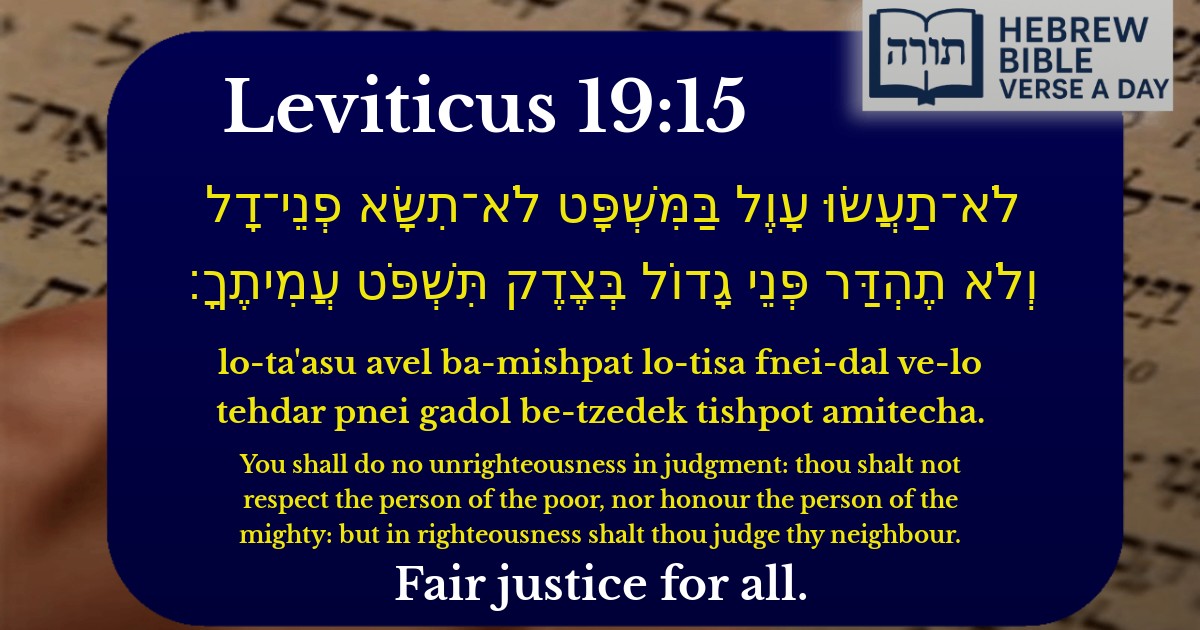Join Our Newsletter To Be Informed When New Videos Are Posted
Join the thousands of fellow Studends who rely on our videos to learn how to read the bible in Hebrew for free!
Hebrew Text
לֹא־תַעֲשׂוּ עָוֶל בַּמִּשְׁפָּט לֹא־תִשָּׂא פְנֵי־דָל וְלֹא תֶהְדַּר פְּנֵי גָדוֹל בְּצֶדֶק תִּשְׁפֹּט עֲמִיתֶךָ׃
English Translation
You shall do no unrighteousness in judgment: thou shalt not respect the person of the poor, nor honour the person of the mighty: but in righteousness shalt thou judge thy neighbour.
Transliteration
Lo-ta'asu avel ba-mishpat lo-tisa fnei-dal ve-lo tehdar pnei gadol be-tzedek tishpot amitecha.
Hebrew Leining Text
לֹא־תַעֲשׂ֥וּ עָ֙וֶל֙ בַּמִּשְׁפָּ֔ט לֹא־תִשָּׂ֣א פְנֵי־דָ֔ל וְלֹ֥א תֶהְדַּ֖ר פְּנֵ֣י גָד֑וֹל בְּצֶ֖דֶק תִּשְׁפֹּ֥ט עֲמִיתֶֽךָ׃
לֹא־תַעֲשׂ֥וּ עָ֙וֶל֙ בַּמִּשְׁפָּ֔ט לֹא־תִשָּׂ֣א פְנֵי־דָ֔ל וְלֹ֥א תֶהְדַּ֖ר פְּנֵ֣י גָד֑וֹל בְּצֶ֖דֶק תִּשְׁפֹּ֥ט עֲמִיתֶֽךָ׃
🎵 Listen to leining
Parasha Commentary
📚 Talmud Citations
This verse is quoted in the Talmud.
📖 Shevuot 30a
The verse is cited in the context of discussing the principles of fair judgment and the prohibition of showing partiality in legal matters.
📖 Sanhedrin 7b
The verse is referenced in a discussion about the ethical obligations of judges to administer justice impartially.


Prohibition of Unrighteous Judgment
The verse (Vayikra 19:15) commands, "לֹא־תַעֲשׂוּ עָוֶל בַּמִּשְׁפָּט" ("You shall do no unrighteousness in judgment"). Rashi explains that this refers to perverting justice, whether by favoring one party over another or by intentionally misapplying the law. The Rambam (Hilchot Sanhedrin 20:1) elaborates that judges must avoid any form of bias, as even a slight deviation from impartiality constitutes a violation of this prohibition.
Forbidding Partiality Toward the Poor
The phrase "לֹא־תִשָּׂא פְנֵי־דָל" ("thou shalt not respect the person of the poor") warns against favoring a poor litigant out of misplaced compassion. The Sifra (Kedoshim 4:4) teaches that a judge must not assume a poor person is automatically truthful simply because of their disadvantaged status. The Talmud (Shevuot 30a) further states that showing undue sympathy in court distorts justice, which must be based solely on truth.
Forbidding Deference to the Mighty
The continuation, "וְלֹא תֶהְדַּר פְּנֵי גָדוֹל" ("nor honour the person of the mighty"), prohibits judges from showing favor to the wealthy or powerful. The Midrash (Vayikra Rabbah 30:1) emphasizes that justice must be blind to social status, as fear of influential individuals corrupts judgment. The Rambam (Hilchot Sanhedrin 23:1) adds that even subtle gestures of respect toward a prominent litigant are forbidden, as they may influence the court's ruling.
The Obligation of Righteous Judgment
The verse concludes, "בְּצֶדֶק תִּשְׁפֹּט עֲמִיתֶךָ" ("but in righteousness shalt thou judge thy neighbour"). The Sforno explains that "righteousness" requires judges to investigate cases thoroughly and rule according to the strict truth, without compromise. The Talmud (Sanhedrin 7b) teaches that judges must strive to emulate Hashem's attribute of absolute justice, as it says (Devarim 1:17), "for judgment is G-d's."
Practical Applications